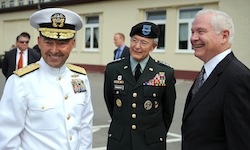NATO Commander Supports Collaboration with Russia
March 11, 2010
Featured Image
We are happy to serve you a daily summary of the day's top nuclear policy stories each morning, with excerpts from the stories in bullet form.
Stories we're following today:
NATO Commander Backs Cooperation with Russia on Missile Defense - Ria Novisti [link]
- The new U.S. adoptive approach for European missile defense includes the possibility of using a Russian radar system as part of an integrated system, NATO's top military officer Admiral James Stavridis has said.
- Stavridis told the U.S. Senate Armed Services Committee on Tuesday that he supported the idea of partnering with Russia as a way to enhance security against shared missile threats.
- "Working with Russia is about balance and seeking to find the potential for cooperation, while maintaining an honest and open dialogue about all aspects of our relationship, including where we disagree," the statement said.
- He went on to say, "We at European Command are ready to pursue military-to-military communication, engagement, and even training and operations with Russia where and when appropriate."
Mideast Feels 'Tricked' by Nuclear Arms Treaty - Agence France Presse [link]
- Middle Eastern countries feel tricked by the 40-year-old nuclear non proliferation treaty, an Egyptian diplomat warned on Wednesday, less than two months before crucial talks on the arms control deal.
- Egypt's ambassador to the UN in Geneva and the conference on disarmament, Hisham Badr, said there was widespread resentment towards the NPT, which forms the cornerstone of efforts to stop the spread of nuclear weapons.
- Badr suggested the nuclear powers had failed to hold their side of the bargain, while attempts to secure a nuclear weapons free Middle East at the NPT have constantly been postponed.
- He warned that a Middle East resolution would be "pivotal" to the success of the review conference and the future of the arms control treaty.
Iran Warns Neighbors Over US Presence in the Gulf - Reuters [link]
- Iranian President Mahmoud Ahmadinejad warned Gulf countries on Thursday against the U.S. presence in the region, saying Washington aimed to dominate their energy resources in the name of fighting terrorism.
- Ahmadinejad and U.S. Defense Secretary Robert Gates traded barbs on Wednesday during separate brief visits to Afghanistan, where Washington has troops at war but Tehran has growing clout.
- In a news conference in Kabul, Ahmadinejad said U.S. and Western troops would never defeat terrorism by waging war in Afghanistan.
- Gates said earlier in the week that Iran was playing a "double game" in Afghanistan by being friendly to the government while trying to undermine the United States.
Right-Wing Paranoia in US and Russia Over Missile Defense is a Big Arms Control Obstacle - Max Bergmann in the Wonk Room [link]
- While missile defense concerns on both sides can likely be resolved for the START follow-on treaty, eventually US-Russian tension over missile defense will have to be resolved if the President is to further advance his disarmament agenda.
- The Russians fear that if we both cut our nuclear forces to the same levels, they will be at a disadvantage, because long range missile defense programs conceivably (if they actually worked effectively which they don’t) could take out some Russian nukes, thereby depriving the two sides of nuclear parity.
- Missile defense won’t make us safer or protect us from nuclear attack, instead it will only lead to greater international distrust and a new nuclear arms race.
- Hence, right-wing paranoia in the United States about Russian nuclear intentions plays directly into Russian paranoia about America’s nuclear intentions.
Normalizing a Nuclear-Armed Middle East - World Politics Review [link]
- Israel's infrastructure minister's announcement of its intentions to build a civilian nuclear reactor is significant, for muddying the waters on so many different high-stakes fronts at once.
- It puts France and the U.S. on the spot regarding a potential non-NPT "India exception" for Israel, at the very moment when both are trying to round up support for sanctions against Iran's non-compliant -- but NPT-bound -- nuclear program.
- It normalizes the simultaneous possession of an opaque weaponized nuclear program and a transparent civilian nuclear program at the very moment when fears of this very normalization are at the top of the regional agenda.



